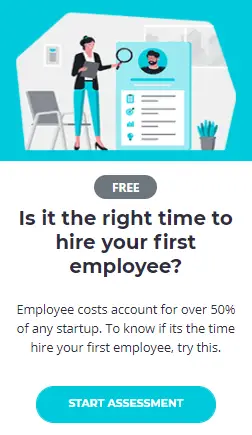When and How Should Startups and Small Businesses Hire Their First Employee?
Hey there, fellow entrepreneurs and go-getters!
Today, we’re diving deep into a topic that’s crucial for the growth and success of startups and small businesses: hiring their first employee.
As a business owner, knowing the right time and approach to bring someone on board can make all the difference.
Understanding the Right Time to Hire
Assessing Workload and Efficiency
Picture this: you’ve been burning the midnight oil, hustling day in and day out to keep your business afloat.
You’re wearing multiple hats, juggling tasks, and feeling like there just aren’t enough hours in the day. Sound familiar? Well, that’s a sign that it might be time to consider hiring your first employee.
Take a step back and evaluate your workload.
Are you constantly overwhelmed? Do you find yourself neglecting important aspects of your business? If so, it’s a clear indicator that you need a helping hand.
Bringing someone onboard can relieve the burden and allow you to focus on strategic growth and higher-value tasks.
Financial Viability and Revenue
Before leaping into the hiring process, it’s crucial to evaluate your financial position.
Hiring an employee involves more than just paying their salary. You need to consider the additional costs, such as benefits, payroll taxes, and potential training expenses.
It’s essential to ensure that your business can sustain these expenses without compromising its financial stability.
Assess your revenue and cash flow to determine if you have the resources to support a new hire. Consider projecting future growth and potential return on investment. Remember, while hiring an employee requires an upfront investment, it can ultimately drive revenue growth and propel your business forward.
Customer Demand and Service Levels
One of the most compelling reasons to hire your first employee is an increase in customer demand. If you find yourself struggling to keep up with client inquiries, orders, or service requests, it’s a clear indication that your business is growing. Ignoring this demand can lead to dissatisfied customers and missed opportunities.
By hiring a dedicated employee, you can improve customer service levels, enhance response times, and ensure a seamless experience for your clients.
Remember, happy customers are loyal customers, and word-of-mouth referrals can be a powerful growth engine for your business.
The Process of Hiring Your First Employee
Define Roles and Responsibilities
When it’s time to bring in a new team member, it’s essential to define their roles and responsibilities clearly. Start by assessing your business’s pain points and identifying the areas where additional help is needed the most.
Craft a job description that outlines the qualifications, skills, and expectations for the position.
Moreover, consider the cultural fit within your organization.
As a startup or small business, the first few team members play a significant role in shaping your company’s culture. Look for individuals who align with your values, mission, and vision.
Remember, skills can be developed, but a positive attitude and shared passion are invaluable assets.
Seek Out Talent
Now that you’ve defined the role, it’s time to find the perfect match for your team.
Begin by tapping into your network and spreading the word within your industry or professional circles. Leverage social media platforms, job boards, and professional networking sites to attract potential candidates.
In the early stages of your business, it’s crucial to hire individuals who are versatile, self-motivated, and capable of wearing multiple hats.
Startup life requires a “get-it-done” mentality, and hiring adaptable individuals can be a game-changer for your team’s success.
Conduct Interviews and Assess Fit
Interviews provide an opportunity to dig deeper into a candidate’s skills, experience, and cultural fit.
Prepare a list of thoughtful and relevant questions that not only evaluate their qualifications but also assess their compatibility with your team and company values.
During the interview process, pay attention to how candidates communicate, problem-solve, and handle unexpected situations.
Look for indicators of their adaptability, enthusiasm, and willingness to learn.
Remember, hiring your first employee is a crucial decision, and finding the right fit can set the stage for future growth and success.\
Onboarding and Training
Once you’ve found the perfect candidate, it’s time to onboard and train them effectively.
Start by providing a comprehensive orientation that familiarizes them with your company’s culture, policies, and processes.
Set clear expectations and goals to ensure a smooth transition into their role.
Consider implementing a structured training program to equip your new employee with the necessary skills and knowledge. P
rovide ongoing support and feedback to help them grow and thrive within their position.
Remember, investing time and effort in their development will benefit both your employee and your business in the long run.
The Benefits of Hiring Your First Employee
Increased Productivity and Efficiency
As a solopreneur or small business owner, your time and energy are limited resources. By hiring your first employee, you can delegate tasks, freeing up valuable time to focus on strategic initiatives.
This increased productivity and efficiency can lead to accelerated growth and improved business performance.
Enhanced Expertise and Skill Sets
When you bring a new team member on board, you gain access to their unique expertise and skill sets. Their fresh perspective and knowledge can bring new ideas, innovation, and creativity to your business.
As a startup or small business, leveraging diverse talents can help you stay competitive and adapt to evolving market trends.
Scalability and Growth Opportunities
Hiring your first employee lays the foundation for scalability and future growth. With a reliable team member in place, you can take on more clients, expand your service offerings, and pursue new opportunities.
A well-structured team allows your business to handle increased workload and scale operations efficiently.
Improved Work-Life Balance
Running a business can be all-consuming, often blurring the boundaries between work and personal life. By hiring an employee, you can regain some work-life balance.
Sharing the workload allows you to prioritize personal well-being and spend more time on activities you enjoy, ultimately leading to greater happiness and fulfillment.
Related Posts
Conclusion
Congratulations, my fellow entrepreneurs, on embarking on the exciting journey of hiring your first employee!
By assessing your workload, evaluating financial viability, and recognizing customer demand, you can determine the optimal time to expand your team. Remember to define roles and responsibilities, seek out talent, conduct thorough interviews, and provide a comprehensive onboarding experience.
With the right team member by your side, you can boost productivity, tap into diverse skill sets, and position your business for scalable growth. Embrace the opportunity to enhance work-life balance and focus on strategic initiatives that drive your business forward.
So, take the leap, trust your instincts, and get ready to witness the transformative power of a strong and dynamic team!















